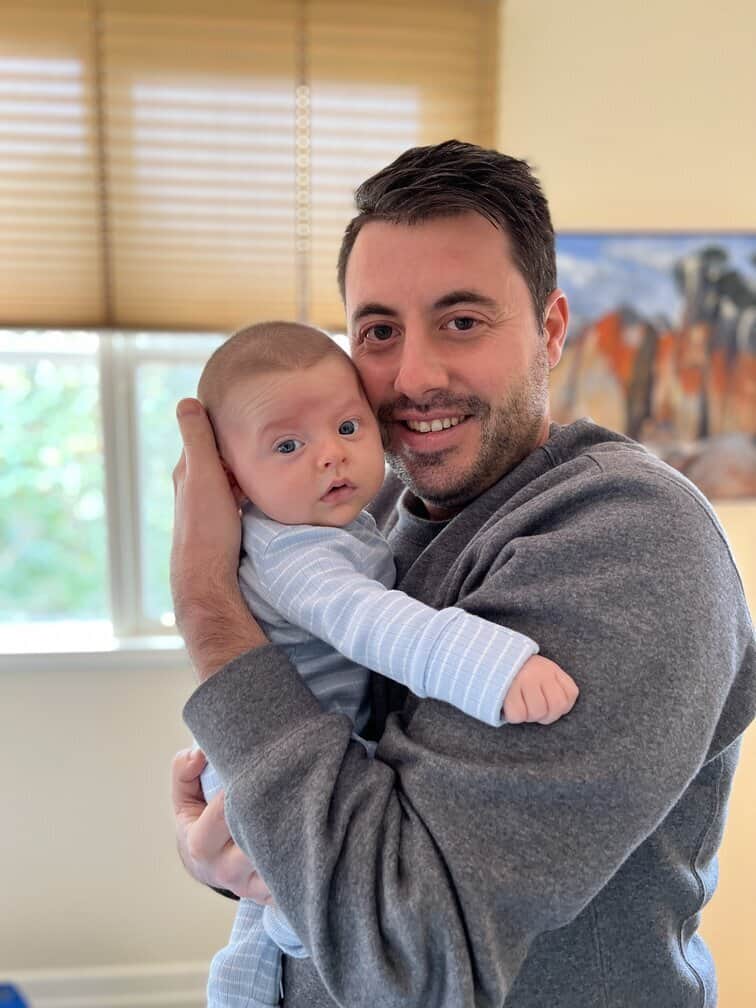As a father myself, I understand how hard it is trying to work and deal with a lack of sleep at night. The 8-month sleep regression is particularly frustrating, as it seems to come out of the blue: why is my baby suddenly waking up at night when they were so settled beforehand?
Why is this so hard when we’ve already survived the newborn-night-waking phase? On top of that, why are they so grumpy, clingy, and needy all the time?
Don’t worry. The 8 Months sleep regression won’t last forever, although I appreciate it feels like it at the time. Here’s everything you need to know about the 8-month sleep regression, as well as some hints and tips on how to get through it.
What is the 8-month sleep regression?
The 8-month sleep regression can be explained when you look at what’s going on with your baby’s development. Although it’s called the 8-month sleep regression, it can occur at any time between 7 and 9 months.
According to the book The Wonder Weeks, this fussy phase can come before a massive leap in your baby’s growth. You may notice your baby starts to attempt new things during or after the fussy period: developing their pincer grip, squashing up their lunch between their fingers, and so on. Everything is about textures at this stage, with babies learning more and more about the world through their senses.
Unfortunately, babies also go through a period of fussiness, clinginess, and lack of sleep. This is frustrating for parents, primarily if you’ve just worked hard to get your baby settled into a routine. It espects sleep, be especiallyause your baby may wake more in the night seeking comfort, and may cry out for you even at times that they would have slept through before.
Read Also: What is a Sleep Regression?
How to Tell If Your Baby is Experiencing the 8-Month Sleep Regression
Here are some key signs to look for:
- Clinginess. A key symptom of this regression is clinginess, with babies becoming shy around people outside of their primary carers. Your baby may find it harder to separate from you, and they may want to be cuddled more often. This is the time when you’ll be trying to get jobs done with a baby balanced on your hip all day. You may also notice that your baby clings tighter to you than normal!
- Poor sleeping. An obvious sign, a lack of sleep even if you had a nice routine before is expected at this stage of your baby’s development. They may try to stay awake in the daytime, which can impact their naptimes, and they may wake up more often at night.
- Nightmares. Your baby may have disturbed sleep at this point due to nightmares. Their brains are busy, and occasionally, their dreams may wake them up at night.
- Lots of love. Babies may become more loving at this stage. You may notice an increase in snuggles and kisses, which kind of makes up for the rest of the symptoms.
- General discontentment. Even the most chilled-out and super-relaxed baby may start to become grumpy at this point. They may seem ‘listless’, unable to settle on anything, and moodier than usual.
How to Navigate the 8-Month Sleep Regression
Believe me, I know what it’s like to be up with your baby all night. This phase won’t last, but it’s still tough to get through it. Here are a few things you can do while you wait for this stage of their development to pass:
Call for help
I’m a firm believer in asking for help when necessary and giving support to others in return. If you’re on your knees with tiredness, it’s hard to function, especially if you have to work all day. So ask for help where you can: can someone cook meals for you, take care of your laundry, or watch the baby at the weekend for a couple of hours so you can catch up on some sleep?
Alternatively, don’t feel bad about outsourcing what you can at this stage, if your budget allows for it. Book a cleaner, get some takeout, whatever it takes to get through the tiredness.
Give them comfort
If your baby usually settles themselves to sleep, it can be so frustrating when they refuse to do it. However, babies do need more comfort at this stage. You don’t have to completely disrupt the routine, though. If they’re really upset, consider giving them more contact than you usually would as they drift off to sleep: rubbing their back or cuddling them for a bit longer before you put them down.
Bad habits are hard to break, but if you this is an option baby absolutely won’t settle, give them as much love and quality time as you can in the daytime to fill up their ’emotional needs tank’. It’s hard to get anything done with a baby attached to you all the time, but this stage will pass, and one day you’ll miss it (or so I’ve heard!).
Don’t change the nap routine
Your baby may fight their naps more than usual, but it’s worth roughly sticking to their regular schedule where possible. They still need the same amount of sleep in the day as they did earlier, and dropping a nap could cause them to become overtired, making them more frustrated and upset at night. Of course, one day they’ll become a toddler ready to drop naps, but not just yet.
Having said that, you can’t force a baby to sleep! So if they refuse to nap, there’s not much you can do, but try to encourage them to sleep as they usually would if you can.
Let them explore their new skills
Their fine motor skills are developing rapidly, and babies love exploring different textures at this stage. Introduce a sensory basket – this can be made up of objects from around the house, as long as they’re not small enough for your baby to choke on – and fill it with different textures. This may keep them more entertained than their toys at this stage!
Also, make time for your baby to practice any new skills like crawling or shuffling. They need time to practice, and it’ll wear them out (in theory).
Talk about how you feel
I always say this, but it’s so important to talk about how you feel right now. Sleep deprivation is emotionally as well as physically challenging, so make sure you keep the lines of communication between you and your partner wide open. Allow them to share their feelings, and share yours in return.
You can also talk about how you feel with friends and family. However, don’t bottle up your emotions; being a parent is really tough, especially at this stage.
Continue the bedtime routine
Hopefully, you’ve got a good bedtime routine going now, and perhaps a sleep schedule that has been in place since they were a few months old. Keep that going, even if your baby is more fussy or clingy than normal. A bedtime routine can include:
- A relaxing warm bath
- Getting dressed in a quiet, dimly lit environment
- Bedtime stories
- Lullabies or a white noise machine (see some recommendations in our guide to the best baby sleep products)
- Speaking calmly and quietly
How to Do Sleep Training in the 8-Month Sleep Regression
Now is not the time to start a new sleep training regime. Your baby won’t take to it well, as they’ll already be unsettled.
However, this doesn’t mean you can’t keep your already-established sleep training routine going. Your baby might need some extra comfort at bedtime, with more extended cuddles, back rubbing, and shushing.
Frequently Asked Questions
Here are some of the most commonly asked questions about the 8-month sleep regression:
Question: How can I get anything done at this stage?
Answer: I know how you feel. It’s so tricky trying to get anything done when your baby wants to be held constantly!
I would say, use a wrap or baby carrier if you can. This will allow you to get some tasks complete some tasks and tolerate a sling). It’s worth a try, anyway. You can check out our guide to the best baby carriers for doing chores for some ideas.
If you do have to leave your baby to cry in a safe place for a few moments, don’t worry. Sometimes, you need to use the bathroom, make food, and do other jobs that just can’t be done with a baby in your arms! They won’t come to any harm if you allow them to cry a little. As long as they can see you, they’ll be fine.
Question: How can I deal with the daycare drop-off when my baby is so clingy?
Answer: Ask your daycare for advice. How do they recommend dealing with drop-offs? They’ll have a lot of experience here, so they usually know the best way to go about it.
In my experience, the calmest drop-offs involve a quick handover. A cuddle, a kiss, a cheerful ‘see you later!’ and going straight out of the door (even if they’re crying) is better than a long, drawn-out drop-off, which can make the transition worse. It all depends on your baby, of course.
Question: Does teething play a part in the 8-month sleep regression?
Answer: Yes, teething can keep a baby up at night. However, if your baby is particularly fussy and seems to be rubbing their cheeks or grabbing their face, chances are it’s something to do with their teeth.
Teethers help a lot here, and teething granules can work too.
8 Months Sleep Regression: The Key Takeaways
To sum up, here are the things you need to remember about the 8-month sleep regression:
- It can occur anytime between 7 and 9 months
- It’s normal for babies to be clingy, fussy, grumpy, and difficult at this stage
- Their sleep routine may be disrupted quite a lot at this point
- Keep your current bedtime routine going
- Give them a lot of love and cuddles in the daytime, and don’t worry about getting chores done if you have a clingy baby!
- Let them play with different textured items in the daytime and give them a chance to try out their new movement skills
- Don’t be afraid to ask for help if you need it.
Hold steady: this too shall pass, as they say, and then it’ll be onto the next parenting challenge!
As a new dad himself, David understands the struggles in dealing with a newborn’s sleep schedule. He knows how hard it is to work and deal with a lack of sleep at night. He thoroughly tests out products and can advise which are best for your little one. In his spare time, he enjoys riding ATVs and BMX.




